Importance of Effective Talent Acquisition
Talent acquisition stands as one of the most critical aspects of an organization’s strategy, as it directly impacts a company’s ability to succeed and grow. The process of not just attracting, but effectively acquiring skilled workers is fundamental to establishing a strong foundation and driving business objectives.

Firstly, effective talent acquisition aids in building a high-quality workforce. A strategic, efficient recruitment process ensures the selection of candidates who possess the necessary skills, experience, and cultural fit to drive
performance and productivity. When the right people fill the right positions, businesses can effectively meet their current demands and plan for future challenges.
Moreover, in an increasingly competitive market, a robust talent acquisition strategy serves as a critical differentiator. The ability to attract, hire, and retain top-tier talent can provide companies with a substantial advantage over their competitors. It can lead to improved products or services, more innovative ideas, and enhanced customer experiences.
Effective talent acquisition also contributes to a company’s employer brand, which is becoming a key factor in attracting top talent. By prioritizing the candidate experience, companies can boost their reputation, making them more attractive to high-quality candidates. This not only improves the caliber of applicants but can also increase retention rates, reducing the costs associated with high employee turnover.
Lastly, with the advent of digital technologies and the shifting dynamics of the workplace, effective talent acquisition has become even more essential. Companies need to adapt their strategies to engage with a digital-savvy, diverse, and global talent pool. This includes leveraging tools and technologies for sourcing, recruiting, and onboarding, as well as focusing on diversity and inclusion initiatives.
Introduction of RPO and Its Growing Significance
Recruitment Process Outsourcing (RPO) has emerged as a viable solution for organizations aiming to streamline their hiring practices, reduce costs, and acquire high-quality talent. Talent Sourcing Outsourcing is a form of business process outsourcing where an organization transfers all or part of its recruitment process to an external service provider. This provider then becomes an extension of the organization’s HR or recruitment team, responsible for managing and driving the efficiency of the recruitment process.
The significance of talent-sourcing outsourcing is growing as organizations grapple with the challenges of the evolving job market. Today’s job market is characterized by skills shortages in key areas, an increasingly remote and globally-dispersed talent pool, and candidates who value not only competitive pay but also aspects such as company culture and values, career growth opportunities, and workplace flexibility. These factors combined make the recruitment process more complex and demanding than ever.
Talent sourcing outsourcing addresses these challenges head-on. An RPO provider brings industry expertise, advanced technology solutions, and proven recruitment strategies to the table. They can efficiently manage large-scale recruitment needs, enhance the quality of hires, and reduce the time-to-fill, all while ensuring a positive candidate experience.
In addition, talent sourcing outsourcing enables scalability in response to fluctuating hiring needs, something particularly relevant in the face of economic uncertainty or seasonal industry trends. Companies can ramp up or scale back their recruitment activities as needed, without the need to maintain a large in-house recruitment team.
In an age where talent is a key differentiator for business success, RPO offers a strategic advantage. By effectively managing recruitment processes, RPO enables organizations to focus on their core operations, confident in the knowledge that their talent acquisition is in expert hands.
What Do Statistics Say About
RPO
The global recruitment process outsourcing (RPO) market has demonstrated significant growth over recent years. According to the RPO market analysis by GrandViewResearch, the market size was valued at USD 5.48 billion in 2019, and it is projected to exhibit a compound annual growth rate (CAGR) of 17.4% from 2020 to 2027. By 2021, the value increased to USD 4.8 billion and is predicted to reach USD 26.4 billion by 2031, growing at a CAGR of 19.1% from 2022 to 2031. This growth is driven by the demand for efficient recruiting processes, reduction in overhead costs, and the struggle to secure just-in-time talent. With companies investing in digital technologies, the requirement for a skilled workforce is ever-increasing, leading to a rise in RPO services. Innovations, like artificial intelligence (AI) and machine learning (ML), are being deployed for tasks like self-scheduling interviews, automated CV screening, candidate sourcing, and more, positioning AI as a likely game-changer in the industry.
Several key factors favor the RPO market, such as growing attrition rates across industries and the rapid evolution of the education system. The challenge of selecting the right candidates from a pool of fresh graduates and post-graduates with advanced skillsets has led to the increased focus of employers on core competencies and cost reduction strategies. Based on the
RPO market industry analysis by Technavio, small and medium-sized businesses are leveraging RPO services to transition from traditional HR tasks to strategic decision-making processes. Also, the COVID-19 pandemic has significantly altered recruitment practices, with companies adapting their approaches to comply with social distancing norms, emphasizing the use of advanced recruiting solutions to avoid in-person meetings. In this ever-changing landscape, RPO providers have proven themselves to be adaptable, capable of scaling their services to meet the changing needs of their clients.
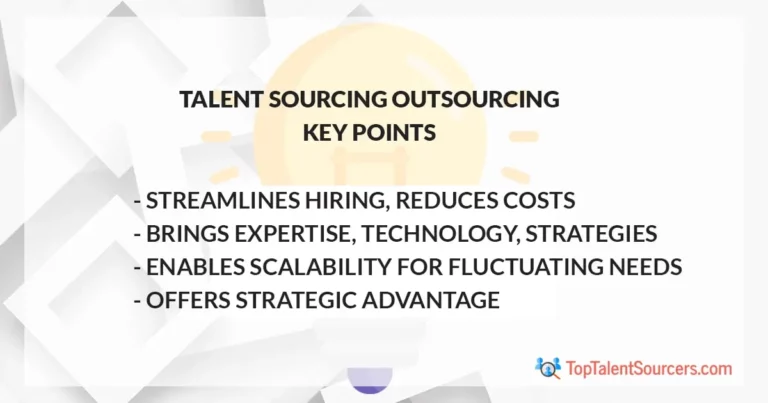
Understanding Talent Sourcing Outsourcing & RPO
Recruitment Process Outsourcing (RPO) is a strategic business model where a company delegates its recruiting operations to an external service provider. This model is designed to provide businesses with the ability to attract, recruit, and onboard talent effectively and efficiently.
Flexible
RPO can be configured in several ways to suit the needs of an organization. Some companies may choose to outsource their entire recruitment process, while others may opt for a more selective approach, outsourcing specific components or hiring projects. For example, a company might engage a talent-sourcing services provider for high-volume hiring needs or for positions requiring specialized skills that are challenging to fill.
FUNCTIONAL
RPO provider assumes the role of the company’s internal recruitment team, overseeing the entire recruitment lifecycle, from sourcing and screening candidates to coordinating interviews and onboarding. This collaborative approach results in a deep alignment between the talent sourcing services provider and the organization’s strategic objectives, culture, and values, ensuring the acquisition of talent that is a good fit for the company.
Up-to-Date
It often leverages advanced recruitment technologies and data analytics to streamline processes and improve hiring outcomes. By harnessing data-driven insights, RPO providers can help businesses make informed decisions about talent acquisition strategies, improve time-to-hire and quality-of-hire, and ultimately, deliver significant cost savings
Effective
The key to talent sourcing outsourcing’s effectiveness lies in its scalability and flexibility. Whether a company needs to quickly ramp up hiring to meet seasonal demands or scale back in response to market fluctuations, RPO providers offer the resources and capabilities to adapt quickly and efficiently.
In today’s competitive talent market, understanding and effectively leveraging the outsourcing hiring process can provide businesses with a crucial edge, enabling them to secure top talent while maintaining focus on their core operations.
RPO Models and Examples
There are several models of RPO, each offering a different level of service and engagement.
End-to-End RPO
In this model, the talent sourcing outsourcing services provider manages the entire recruitment process, from job requisition to onboarding. This includes sourcing, screening, interviewing, background checks, offer management, and onboarding processes. It is a comprehensive solution best suited to companies with large-scale, ongoing recruitment needs.
Project RPO
This model is typically used when a company needs to fill a large number of positions in a specific timeframe, such as for a new product launch or expansion into a new market. The RPO provider manages the recruitment for this specific project, scaling up or down as necessary.
Selective RPO
In a selective RPO, only certain parts of the recruitment process are outsourced, such as sourcing and initial screening of candidates. This model provides flexibility and is often used by companies that have strong internal recruitment teams but need support for specific tasks.
On-Demand RPO
This model is used when a company has unexpected or fluctuating recruitment needs. The talent sourcing outsourcing services provider steps in as needed, providing immediate support without the need for a long-term contract.

Examples of RPO in practice range from global companies using end-to-end RPO to manage their continual hiring needs, to tech startups engaging project RPO services to quickly build a team of skilled developers for a new product launch. The flexibility of RPO allows it to be tailored to the unique needs and goals of each organization.
Talent Sourcing RPO Vs. Other Outsource Recruitment Methods
In the dynamic world of talent acquisition, businesses continuously seek ways to attract, hire, and retain the best professionals efficiently. Among the solutions are various models of recruitment outsourcing, each with its unique approach and benefits. The most notable among these is Recruitment Process Outsourcing (RPO), which has been gaining popularity due to its comprehensive, strategic approach to recruitment. However, RPO is not the only option; there are several other recruitment outsourcing methods such as traditional recruitment agencies, IT staffing agencies, and freelance recruiters.
To make the best decision for your organization, it’s important to understand how RPO compares to these other models. In the following sections, we’ll examine the key differences, pros, and cons of it and other outsource recruitment methods, providing a clearer picture of which solution might be the best fit for your company’s specific needs.
RPO vs Staffing: An In-Depth Comparative Analysis
The effectiveness of an organization often depends on its human resource management strategy. Two popular methodologies that companies use for hiring new talent are Recruitment Process Outsourcing (RPO) and Staffing. However, the lines between these two methods are often blurred, leading to confusion about which is the best approach. This article will draw a clear distinction between RPO and Staffing, detailing their advantages, disadvantages, and most suitable applications. We will provide a comprehensive comparison to help businesses decide which strategy is best suited to their needs.
As hiring dynamics continue to evolve, the need for adaptable, efficient, and cost-effective recruitment strategies will remain paramount. Choosing these is not about which is better in a general sense, but rather about understanding which fits best within the unique context of your business. Therefore, a strategic evaluation of business needs, growth plans, and current recruitment capabilities is essential in making this decision. Whether you choose RPO, Staffing, or a blend of both, the ultimate goal is to ensure that your human capital aligns with your business objectives.
RPO vs Staffing – A Comparative Table
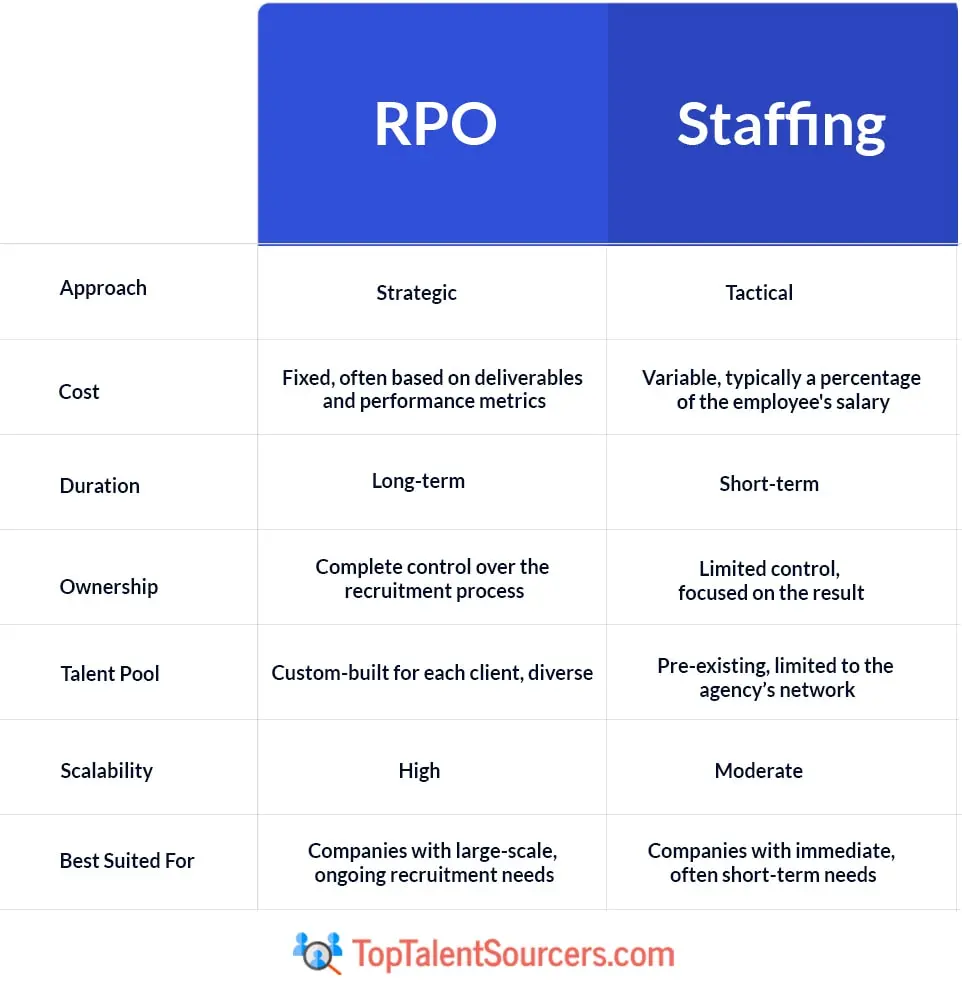
Which to Choose?
The choice between RPO and Staffing ultimately depends on the organization’s unique needs and objectives. For organizations looking for a strategic partner to enhance their overall recruitment process, increase efficiency, and reduce costs, RPO might be the way to go. However, for businesses that need to fill specific roles quickly or manage high staff turnover, staffing agencies can be a more practical choice.
In essence, both RPO and Staffing provide unique advantages and can be effectively used in different scenarios. As recruitment trends continue to evolve, a hybrid approach utilizing both strategies could provide a comprehensive, adaptable, and efficient recruitment solution.
RPO vs BPO: A Comparative Analysis
As businesses strive to streamline operations, improve efficiency, and reduce costs, outsourcing has become an increasingly attractive solution. Two commonly used outsourcing models are Recruitment Process Outsourcing (RPO) and Business Process Outsourcing (BPO). While they share the outsourcing model, their scope and applications are distinctly different. This article will provide a comparative analysis of RPO and BPO, shedding light on their respective benefits, applications, and implications.
In the modern business landscape, the importance of strategic outsourcing cannot be understated. Whether it’s RPO or BPO, the right outsourcing model can drive efficiency, cost savings, and competitive advantage. However, it’s crucial to align the choice of outsourcing model with the business’s strategic objectives. The best practice is to assess your organization’s unique needs, capabilities, and growth objectives before deciding on an outsourcing model. The key to successful outsourcing lies in selecting the right partner, clear communication of objectives, and effective management of the outsourced function.
RPO vs BPO – A Comparative Table

Which Is The Right One for Me?
Choosing between RPO and BPO depends largely on the specific needs and objectives of your organization. If your business is experiencing high turnover, and growth, or is in an industry with high competition for talent, RPO could be an effective solution.On the other hand, if your organization is looking to streamline multiple business processes, reduce costs, and increase operational efficiency, BPO might be more suitable.
RPO vs Agency Recruitment: A Comprehensive Comparative Analysis
The modern business landscape has seen an evolution in recruitment strategies, and at the heart of this evolution lies the question: which recruitment strategy is best suited for your organization? A common conundrum that businesses face is the choice between Recruitment Process Outsourcing (RPO) and Agency Recruitment. While both methods share the ultimate goal of securing talent, their approaches significantly differ. This article delves into the differences between RPO and Agency Recruitment, providing an in-depth comparison to help guide businesses in making the right recruitment choice.
The recruitment landscape is constantly evolving, demanding businesses to be flexible and strategic in their hiring approaches. Both RPO and Agency Recruitment offer unique advantages that can be effectively leveraged in different scenarios. Businesses must continuously evaluate their recruitment strategies in line with their growth, talent needs, and industry trends.
Ultimately, whether you choose RPO, Agency Recruitment, or a blend of both, the aim should be to secure the best talent cost-effectively and efficiently, while also improving your employer brand and candidate experience.
RPO vs Agency Recruitment – A Comparative Table
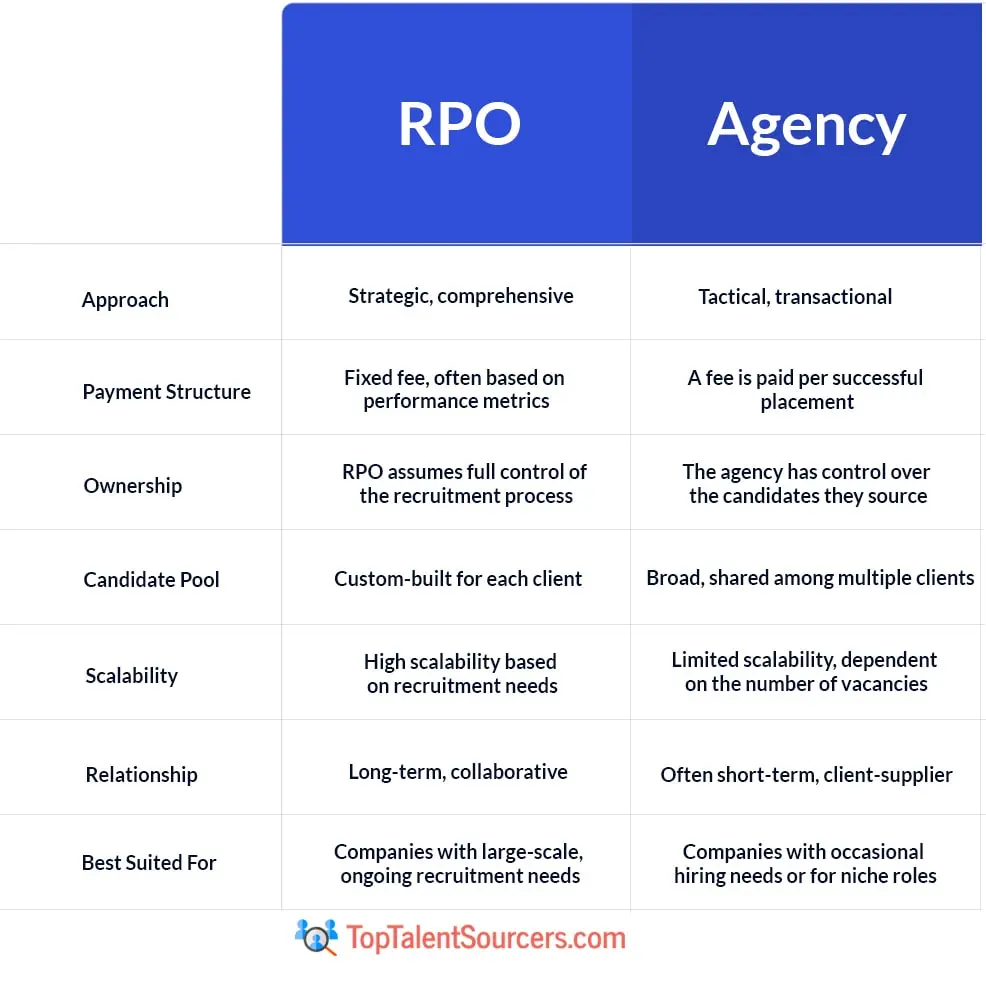
What to Choose?
Deciding between RPO and Agency Recruitment is contingent upon the unique hiring needs and strategic goals of an organization. If a company seeks a strategic partner that can align the recruitment process with the overall business goals, streamline hiring, and reduce recruitment costs, RPO may be the preferred choice.
On the other hand, if an organization has sporadic hiring needs or requires specialized talent for specific roles, Agency Recruitment could provide a more fitting solution.The critical point is to assess your organization’s recruitment needs and long-term business strategy before deciding on the best hiring model.
RPO in Different Sectors
In today’s rapidly evolving business landscape, organizations across various sectors are leveraging Recruitment Process Outsourcing (RPO) to address their unique hiring challenges. This section explores how remote recruitment is being utilized in the tech and finance sectors, and how recruitment consultants are playing a crucial role in talent acquisition across various industries.
RPO in Tech: Sourcing Talent in a Competitive Market
The technology sector is characterized by a fast-paced, highly competitive talent market. Companies are continually seeking skilled professionals in areas such as software development, data science, artificial intelligence, cybersecurity, and more. At the same time, there is a notable skills gap in the industry, with demand for certain tech roles far outstripping supply.
Talent acquisition outsourcing is playing a pivotal role in helping tech companies navigate these challenges. Remote recruitment service providers with expertise in the tech industry, often referred to as Tech RPOs, offer specialized services to attract, recruit, and retain tech talent. They use innovative sourcing strategies and advanced tech tools to identify and engage potential candidates, often before they’re actively looking for a new role.
Moreover, talent acquisition outsourcing can help tech companies improve their employer brand, which is crucial in a market where candidates often have multiple job offers. By ensuring a positive candidate experience and promoting the company’s culture and values, RPO providers can help tech companies stand out from the competition and attract top talent.
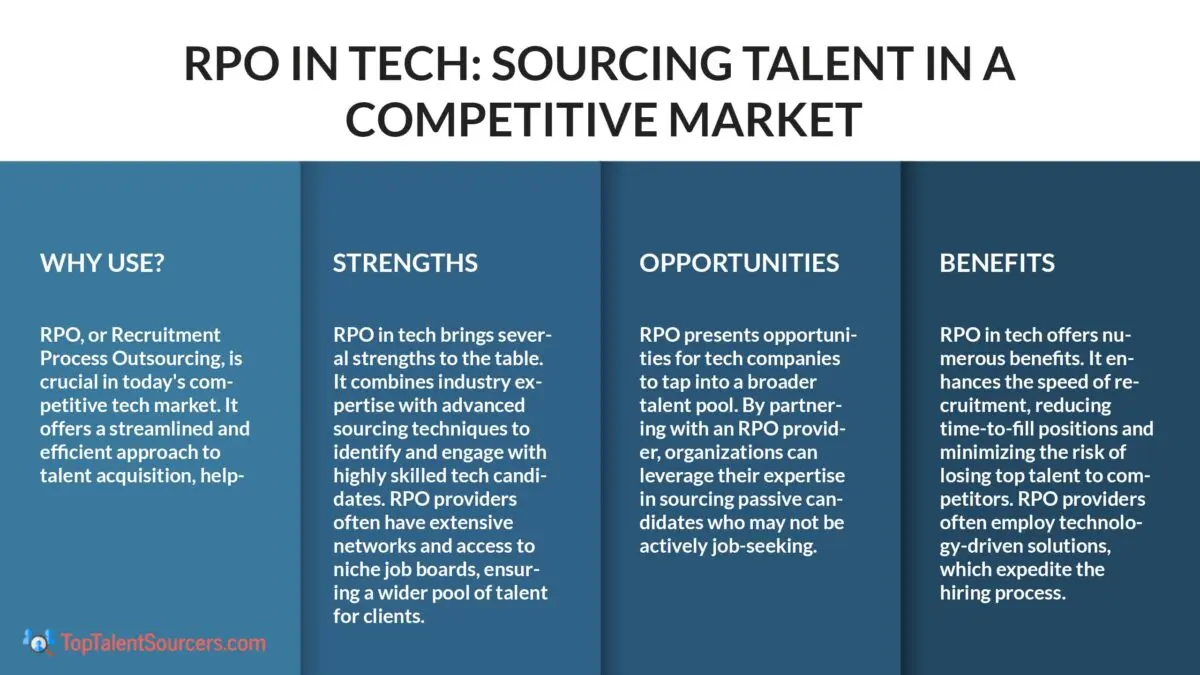
Talent Sourcing Outsourcing in Finance: Meeting Regulatory and Skill Demands
The finance sector presents its unique set of hiring challenges. Regulatory requirements mean that companies must ensure their hires meet specific criteria, while the increasing digitization of the industry has led to high demand for skills such as data analysis and financial technology expertise.
Talent sourcers specializing in the finance sector understand these challenges. They can help companies navigate the complex regulatory landscape, ensuring that all candidates are vetted thoroughly and meet all necessary compliance standards.
Furthermore, finance RPO providers are adept at sourcing candidates with the specialized skills needed in today’s finance industry. They leverage industry connections and advanced sourcing techniques to find and attract these candidates. Through talent sourcing, finance companies can ensure they have access to the talent they need to stay competitive and compliant.
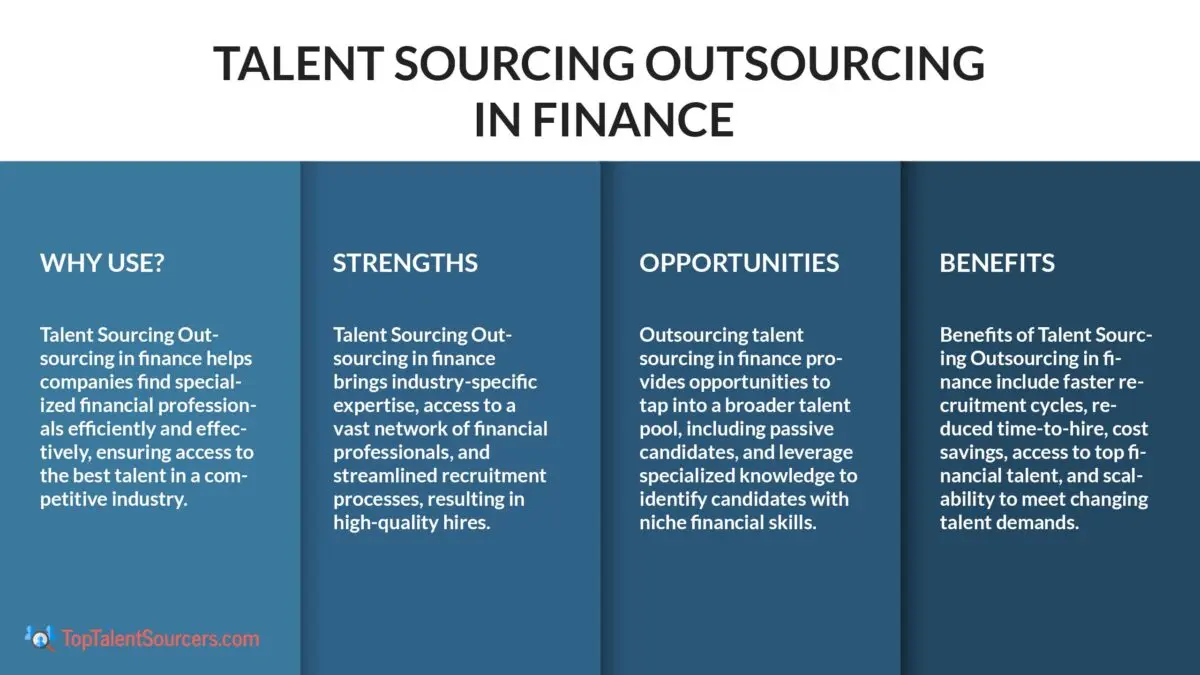
Outsourcing to Recruitment Consultants
in Various Sectors
Beyond tech and finance, companies in various sectors are outsourcing their recruitment processes to specialized consultants. These consultants bring industry-specific knowledge and expertise, which is invaluable in identifying and attracting top talent. They also understand the particular challenges and trends within their industry, allowing them to provide strategic advice on hiring practices.
Recruitment consultants can also help to improve the efficiency of the recruitment process. By taking over time-consuming tasks such as CV screening and initial interviews, they free up internal HR teams to focus on strategic tasks. In this way, outsourcing to recruitment consultants can lead to more effective, efficient recruitment processes across various sectors.
In conclusion, RPO is proving to be a versatile solution, capable of addressing the unique hiring challenges of various industries. Whether it’s sourcing tech talent in a competitive market, navigating the regulatory landscape of the finance sector, or leveraging the expertise of specialized consultants, talent sourcing outsourcing is delivering significant value in diverse sectors.
Why Do Companies Outsource Recruitment?
Recruitment is a fundamental aspect of a company’s operations. It shapes the quality of the workforce, which directly affects the business’s performance and growth. However, managing recruitment in-house can be complex, time-consuming, and costly, prompting companies to consider outsourcing this function. In this section, we will discuss the reasons why companies outsource recruitment and delve into a comparative analysis between in-house and outsourced recruitment.
Advantages and Disadvantages of Talent Sourcing Outsourcing
Advantages
Lorem ipsum dolor sit amet, consectetur adipisicing elit, sed do eiusmod tempor incididunt ut labore et dolore magna aliqua. Ut enim ad minim veniam, quis nostrud exercitation ullamco laboris nisi ut aliquip ex ea commodo consequat.
Expertise and Market Knowledge
Talent sourcing outsourcing brings industry-specific expertise, knowledge of recruitment best practices, and an understanding of the job market. They can target and attract the right candidates more effectively than an in-house team that might not have specialized recruitment expertise.
Scalability
Talent sourcing outsourcing provides the flexibility to scale recruitment efforts up or down as per business needs. This can be particularly beneficial for businesses with seasonal hiring needs or those undergoing rapid expansion.
Cost Savings
Outsourcing can lead to significant cost savings as it reduces the overhead costs associated with maintaining a full-scale, in-house recruitment team. It also lowers cost-per-hire by improving the efficiency of the recruitment process.
Access to Advanced Technology
Talent sourcing outsourcing providers typically leverage advanced recruitment technologies and methodologies, providing a more efficient and effective recruitment process.
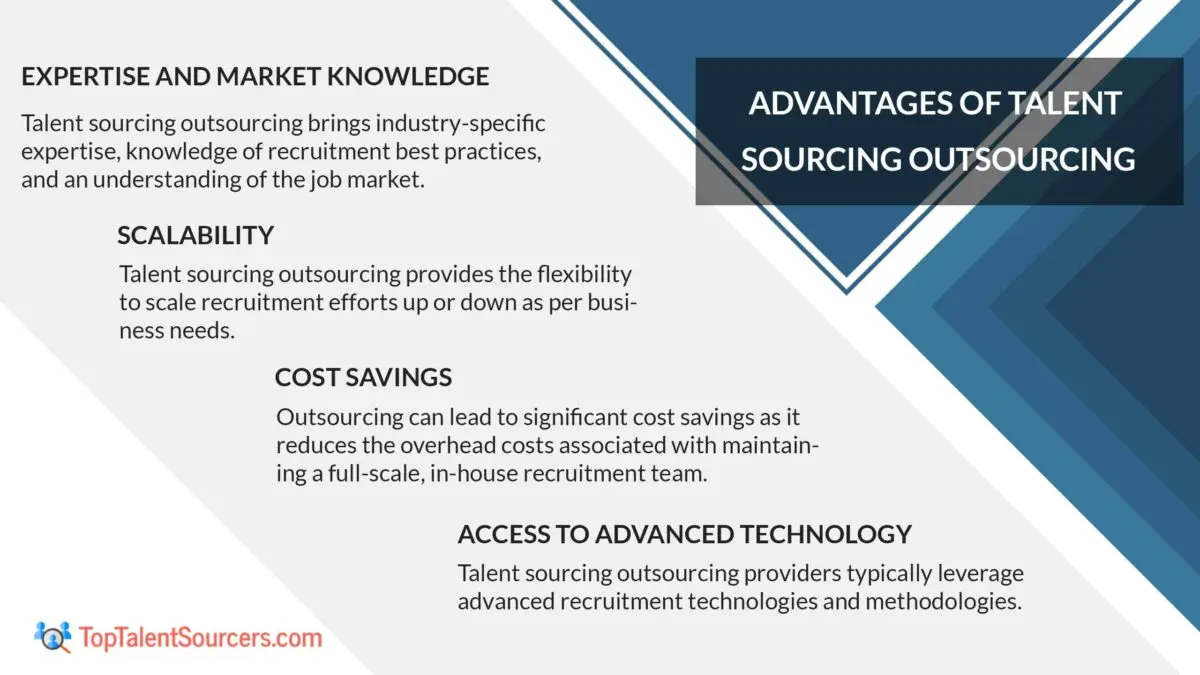
Disadvantages
Less Control
When outsourcing, companies have less direct control over the recruitment process. This could potentially impact the quality of hires if the talent sourcing services provider doesn’t fully understand the company’s culture or specific needs.
Risk of Poor Service
If the talent sourcing services provider doesn’t deliver as expected, it could negatively impact the company’s employer brand and candidate experience.
Outsourcing Talent Acquisition vs. In-house Talent Acquisition
Research and Comparison
Research suggests that RPO can significantly outperform in-house recruitment in terms of efficiency, cost-effectiveness, and quality of hires. Talent acquisition specialists leverage industry expertise, advanced technologies, and efficient processes to reduce time-to-hire and improve the quality of talent acquired.
In contrast, in-house recruitment can often be more time-consuming and costly, especially if the company doesn’t have a dedicated recruitment team. Additionally, in-house teams might lack the specialized knowledge or resources to effectively compete for top talent in a competitive job market.
Cost per Hire Comparison: In-house vs. RPO
Cost per hire is a critical metric in recruitment. It includes all costs associated with filling a vacancy, from advertising and screening to interviewing and onboarding. Outsourcing recruitment can significantly reduce this cost.
According to research, talent sourcing outsourcing can reduce cost-per-hire by up to 50% compared to in-house recruitment. This is achieved through a combination of factors including process efficiencies, economies of scale, and leveraging technology for tasks such as candidate sourcing and screening.
Benefits of Outsourcing Recruitment and Selection Process
Outsourcing the recruitment and selection process can yield numerous benefits. Companies can focus on their core business operations, confident that their recruitment needs are being handled by experts. They can benefit from a more streamlined and efficient process, reducing time-to-hire and improving the quality of hires.
Furthermore, outsourcing can enhance a company’s employer brand by providing a better candidate experience. Talent acquisition specialists are skilled in managing candidate communications and ensuring a positive experience throughout the recruitment process, which can boost the company’s reputation and attractiveness to top talent.
Cost per Hire Comparison: In-house vs. RPO
Cost per hire is a crucial metric in assessing the financial effectiveness of the recruitment process. It includes all costs associated with filling a vacancy, from job advertising and screening to interviewing and onboarding. Comparing in-house recruitment and talent sourcing outsourcing can reveal stark differences.
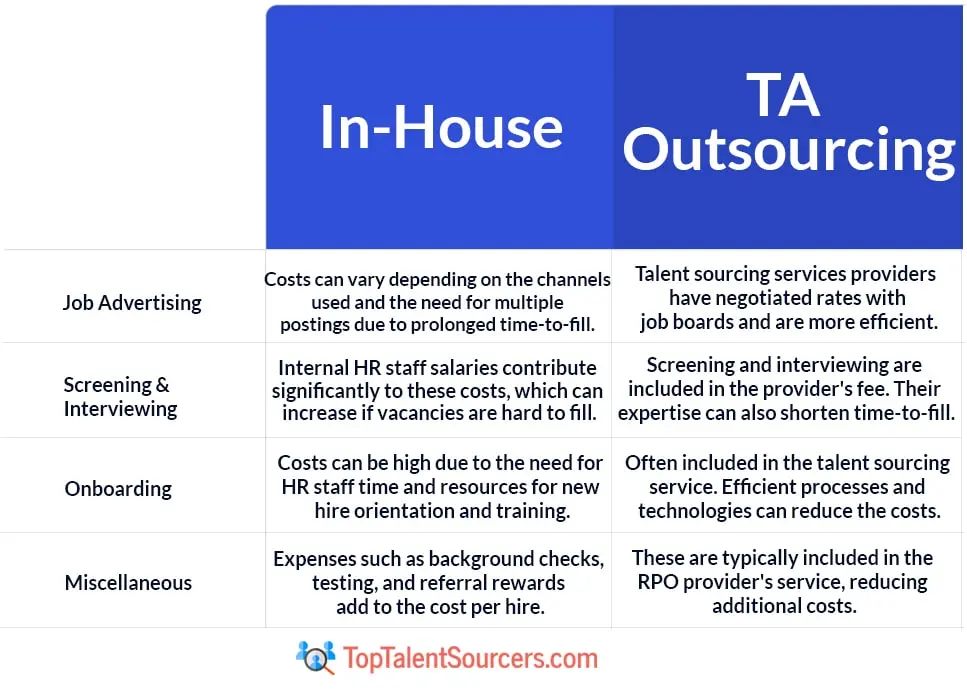
In general, RPO can reduce cost per hire by improving efficiency, providing access to better rates and services, and freeing up internal resources for other tasks.
Future of Talent Sourcing
Outsourcing & RPO
As businesses face increasingly complex talent acquisition challenges, the recruitment process outsourcing (RPO) industry continues to evolve. New trends and practices are emerging, driven by changes in technology, economic conditions, and employer and candidate expectations. The future of RPO is indeed promising, with significant potential for growth and innovation. This article will delve into the future trends of RPO, the concept of Project RPO, and the rising demand for global RPO services.
Trends in RPO and Talent Outsourcing
In recent years, several trends have emerged within the RPO space. These trends reflect a broader shift in the industry towards strategic, value-added services.
Technology Integration
The integration of advanced technologies such as AI, machine learning, and analytics tools is transforming RPO. These technologies enable providers to automate routine tasks, enhance candidate sourcing and engagement, and derive valuable insights from recruitment data.
Strategic Partnership
The RPO client-provider relationship is evolving from a transactional relationship to a strategic partnership. Companies are increasingly seeking RPO providers who can contribute to strategic talent acquisition decisions, provide industry insights, and help shape employer brands.
Candidate Experience
With the growing importance of employer branding, RPO providers are focusing more on improving the candidate experience. This involves enhancing communication, transparency, and engagement throughout the recruitment process.
Diversity and Inclusion
As businesses recognize the value of a diverse workforce, RPO providers are offering services to help companies enhance diversity and inclusion. This includes strategies to attract diverse talent and create a more inclusive recruitment process.

Remote Talent Acquisition and Its Potential
Talent sourcing outsourcing is a more flexible, targeted form of RPO that has emerged in response to changing client needs. Rather than outsourcing the entire recruitment process, companies use Project RPO to address specific recruitment challenges or short-term needs. For example, a company might use Project RPO to handle a sudden spike in hiring needs or fill hard-to-fill positions.
The potential of it lies in its flexibility and scalability. It allows companies to leverage the expertise and resources of an RPO provider when and where they need it most. This model can provide significant cost savings and efficiency improvements, particularly for companies with fluctuating hiring needs.
Moreover, it can also serve as a stepping stone toward full RPO. Companies can start with Project RPO to test the benefits of outsourcing and then expand to a full RPO model if they find it beneficial.
Global RPO Services and Their Growing Demand
With businesses operating on a global scale, the demand for global RPO services is growing. These services enable companies to streamline and standardize their recruitment processes across different geographical regions. This can lead to significant cost savings, improved compliance, and a more consistent employer brand.
Furthermore, global RPO providers bring a wealth of international recruitment expertise. They understand the nuances of different labor markets, legal environments, and cultural contexts, which can be invaluable for companies recruiting in multiple countries.
The growing demand for global RPO services reflects the broader trend toward globalization in business. As companies continue to expand internationally, the need for efficient, effective global recruitment solutions will only increase.
In conclusion, the future of RPO looks bright, fueled by technological advancements, evolving client needs, and the ongoing globalization of business. As the industry continues to innovate and adapt, RPO is set to play an increasingly vital role in helping companies navigate the challenges of talent acquisition in the 21st century.
Unlock Your Full Potential with TopTalentSourcers
Are you struggling to find the right talent for your company’s growth? Partner with TopTalentSourcers, your trusted talent sourcing outsourcing partner. Our expert team will help you access a vast network of skilled professionals in your industry. Don’t miss out on top-notch talent – contact us now to elevate your recruitment game and drive success! Reach out today via form below. Let’s build your dream team together!